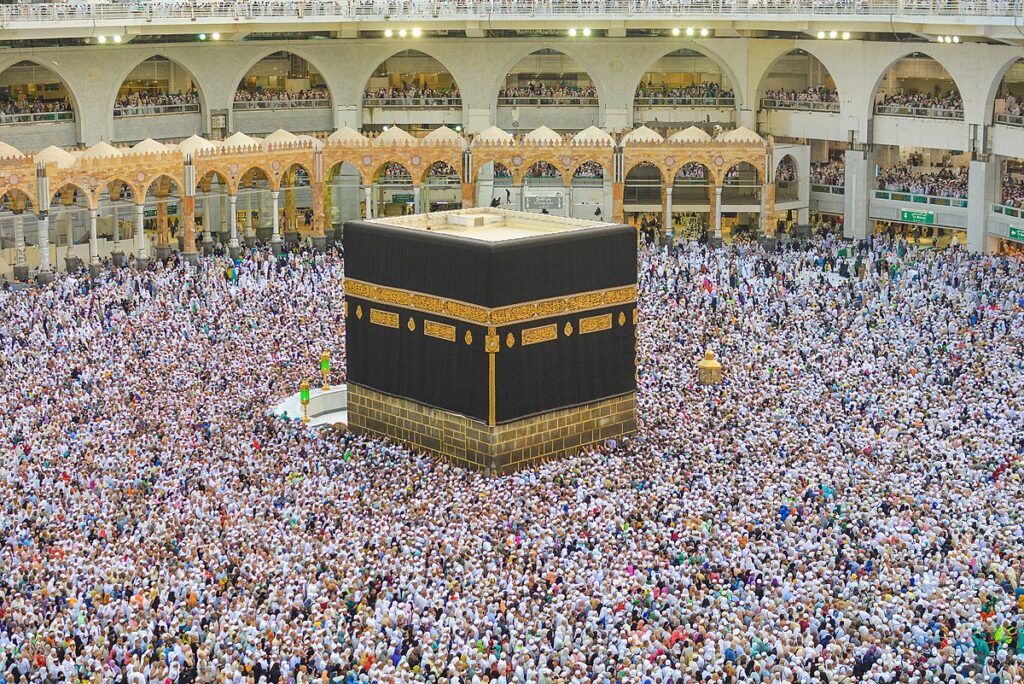What is Islam? Discovering the World’s Largest Religion
Estimated reading time: 12 minutes
Key points of the article:
- Islam is a monotheistic religion, worshipping Allah, originating from Arabia.
- The history of Islam begins with the Prophet Muhammad, who is believed to have received revelations from Allah.
- The Islamic faith includes 6 pillars of belief, 5 pillars of practice, and the Quran is the main scripture.
- Islamic culture is rich, expressed through customs, ceremonies, and the role of the community.
- Islam has a great influence on society, world civilization, and faces many modern issues.
Table of Contents
- I. General Introduction: What is Islam? Discovering the Definition of Islam
- II. History of the Formation and Development of Islam
- III. Core Characteristics of Islam
- IV. Culture and Practices of Muslims
- V. Influence and Role of Islam in Society and the World
- VI. Frequently Asked Questions about What Islam Is
- VII. Conclusion: The Significance of Understanding Islam Correctly Today
I. General Introduction: What is Islam? Discovering the Definition of Islam
Have you ever wondered what Islam is? This is an important question that helps us begin the journey of learning about one of the three largest religions globally. Basically, Islam is a monotheistic religion that originated on the Arabian Peninsula in the 7th century. The name “Islam” has the profound meaning of “submission, obedience to the will of God (Allah)”. This religion worships only Allah, the Supreme Being, with its fundamental teachings conveyed through the prophet Muhammad, recorded in the Quran (Qur’an) and inspired by the angel Gabriel.
In a diverse and increasingly connected world, understanding Islam correctly has become more important than ever. This understanding helps us build cultural bridges, minimize misconceptions, and promote a more tolerant and inclusive society. This religion is not just a faith but also a system of values, customs, and knowledge that has shaped many brilliant civilizations throughout history. Through this article, we will together explore the definition, history, doctrines, practices, social impact, and answer frequently asked questions about Islam, to gain the most comprehensive and objective view.
II. History of the Formation and Development of Islam
To truly understand what Islam is, we need to go back in time to explore the eventful history of Islam. This religion emerged in the early 7th century on the Arabian Peninsula, a region that was politically, economically, and religiously unstable.
Origins and the Prophet Muhammad
The origin of Islam is closely linked to the life of the Prophet Muhammad. Born in 570 AD in Mecca, a bustling trading city, Muhammad experienced a challenging childhood. In 610, he began to receive the first revelations from Allah through the angel Gabriel. These revelations called for the abandonment of the prevalent polytheistic practices of the time, moving towards monotheistic belief, worshipping only Allah.
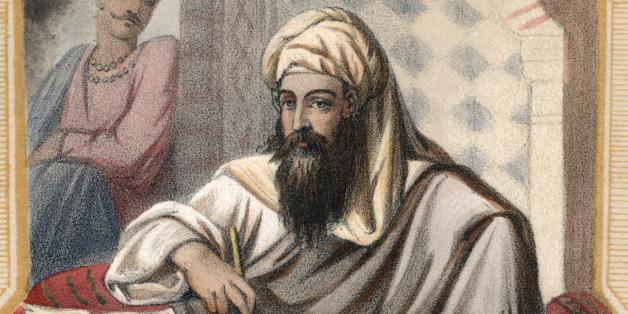
The Hijra and Strong Development
One of the turning points in the history of Islam is the event of the Hijra in 622. Due to strong opposition from the Meccan aristocracy, the Prophet Muhammad and his followers had to migrate from Mecca to Medina (formerly known as Yathrib). This event not only marked the first year of the Islamic calendar but was also a milestone in the formation of a true Muslim community (followers of Islam), with its own distinct political and social system.
After the Prophet Muhammad passed away in 632, the development of Islam was unprecedentedly strong. Under the leadership of the Caliphs (successors), Muslim armies rapidly expanded their territory, establishing powerful Islamic dynasties such as the Umayyad and Abbasid. From West Asia, Islam spread throughout North Africa, Central Asia, parts of Europe (such as Spain), and India, forming a vast empire with a brilliant civilization.
Contributions in the Middle Ages
During the Middle Ages, while Europe was in the “Dark Ages”, the Islamic world was a center of knowledge and development. They made enormous contributions to many fields such as mathematics, astronomy, medicine, philosophy, and architecture, creating vast cultural and scientific legacies that profoundly influenced the course of human civilization.
III. Core Characteristics of Islam
So what constitutes the core of the religion of Islam? The characteristics of Islam are built on a clear system of faith and practice, focusing on monotheism and submission to the will of Allah.
The Faith (Iman) of Islam
The Islamic faith (Iman) consists of six basic pillars that every believer must absolutely believe in:
- Belief in the one and only Allah: There is no god worthy of worship except Allah.
- Belief in angels: Invisible beings who carry out Allah’s will.
- Belief in the holy books: Including the Quran, the Torah (of Judaism), the Gospel (of Christianity) – considered the revelations of Allah.
- Belief in the prophets: From Adam to Muhammad, those who conveyed Allah’s message.
- Belief in the Day of Judgment: The day when all people will be resurrected and judged for their actions.
- Belief in divine decree (Qadar): All events are within Allah’s will and knowledge.
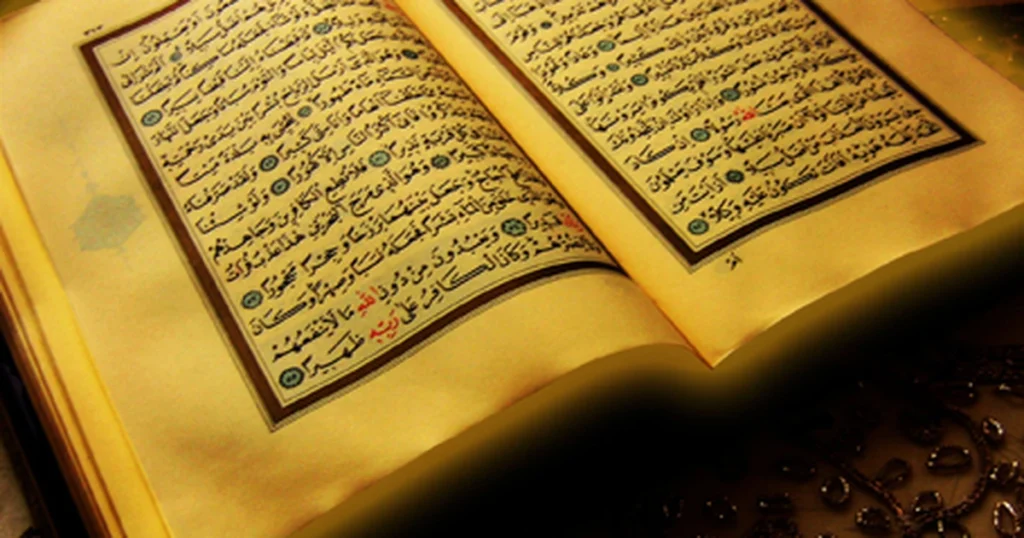
The Qur’an
The Five Pillars of Islam
Besides faith, the doctrine of Islam is also reinforced by five pillars of practice, which are the foundation of every Muslim’s life:
- Shahada (Declaration of faith): Publicly professing that “There is no god but Allah, and Muhammad is His Messenger”. This is the declaration to become a Muslim.
- Salah (Prayer): Performing five daily prayers facing the Kaaba in Mecca at specific times.
- Zakat (Charity): Giving a certain portion of one’s wealth to the poor and needy. This is a form of purifying wealth and supporting society.
- Sawm (Fasting): Abstaining from food, drink, and other physical pleasures from dawn to dusk throughout the month of Ramadan. This activity aims to cultivate self-control, piety, and empathy.
- Hajj (Pilgrimage): Making the pilgrimage to Mecca (Kaaba) at least once in a lifetime, if one is able physically and financially.
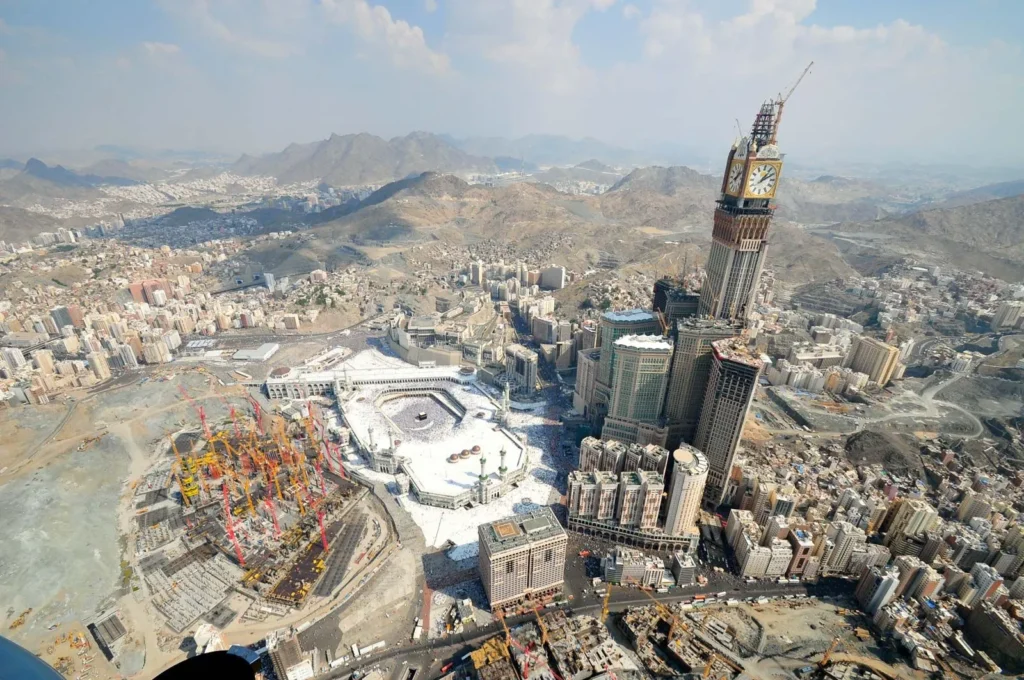
The holy site of Mecca in Saudi Arabia
The Quran and Other Scriptures
The Quran is considered the direct revelation of Allah, the foundation of all aspects of life, morality, and Islamic law. Additionally, the Hadith and Sunnah are records of the teachings, actions, and approvals of the Prophet Muhammad, which serve to supplement and further explain the Quran, helping Muslims apply its teachings in practice.
A General Comparison with Christianity and Judaism
To have a comprehensive view, comparing Islam with other monotheistic religions like Christianity and Judaism is necessary. Although they share many commonalities, such as their Abrahamic origins and belief in a single God, they still have core differences:
| Element | Islam | Christianity | Judaism |
|---|---|---|---|
| Number of gods | Monotheistic (One Allah) | Monotheistic (Trinity: Father, Son, Holy Spirit) | Monotheistic (Yahweh/God) |
| Position of founder | Muhammad (Final Prophet, Messenger of Allah) | Jesus (Savior, Son of God) | Moses (Main Prophet, receiver of the Law) |
| Scripture | Quran, Hadith, Sunnah | Bible (Old & New Testaments) | Torah, Talmud |
| Main pillars/laws | Five Pillars of Islam (Shahada, Salah, Zakat, Sawm, Hajj) | Ten Commandments, Faith in Jesus, the Gospels | 613 Commandments (Mitzvot) in the Torah |
| Foundational ceremonies | Ramadan (fasting), Eid al-Fitr, Eid al-Adha, Hajj | Easter, Christmas, Pentecost | Passover (Pesach), Rosh Hashanah, Yom Kippur |
The greatest commonality among these three religions is the belief in a single God and a line of prophets who conveyed His message. However, they differ on the identity of the final prophet, the role of the Messiah, and specific religious laws in life.
IV. Culture and Practices of Muslims
Islamic culture and the practices of Muslims form a colorful tapestry, reflecting the deep connection between faith and daily life.
Main Customs and Ceremonies
The customs of Islam and ceremonies in the lives of Muslims strictly adhere to the religious laws from the Quran and the traditions of the Prophet Muhammad. From marriage, naming ceremonies for newborns, coming-of-age ceremonies, to funerals, every important life event is conducted according to specific rules, emphasizing purity, responsibility, and community connection. For example, in marriage, consent from both parties and the presence of witnesses are very important.
Influence on Personal and Community Life
Islamic law governs almost every aspect of personal and community life. This includes regulations on diet (Halal food), dress (especially for women, such as the hijab), social interactions, and community responsibilities. Muslims are encouraged to live a moral, just life and to always be ready to support one another, creating a highly cohesive community.
The Role of Mosques
The mosque, or Mosques, is not only a place of worship but also the center for religious activities, education, and charity. Here, Muslims gather to pray, study the Quran, attend lectures, and engage in social activities together, helping to strengthen community solidarity.
Major Holidays
Islamic ceremonies are also expressed through major holidays, which hold deep meaning and have a great impact on the lives of believers:
- Ramadan (Month of fasting, prayer): This is the holiest month of the year, when Muslims fast from dawn to dusk to practice patience, piety, and empathy for the poor.
- Eid al-Fitr (Festival of Breaking the Fast): Marking the end of Ramadan, this is one of the largest and most joyous festivals, featuring feasts, gifts, and community activities.
- Eid al-Adha (Festival of Sacrifice): Commemorating the willingness of the Prophet Ibrahim (Abraham) to sacrifice, this festival involves sacrificing an animal and sharing the meat with family, friends, and the poor.
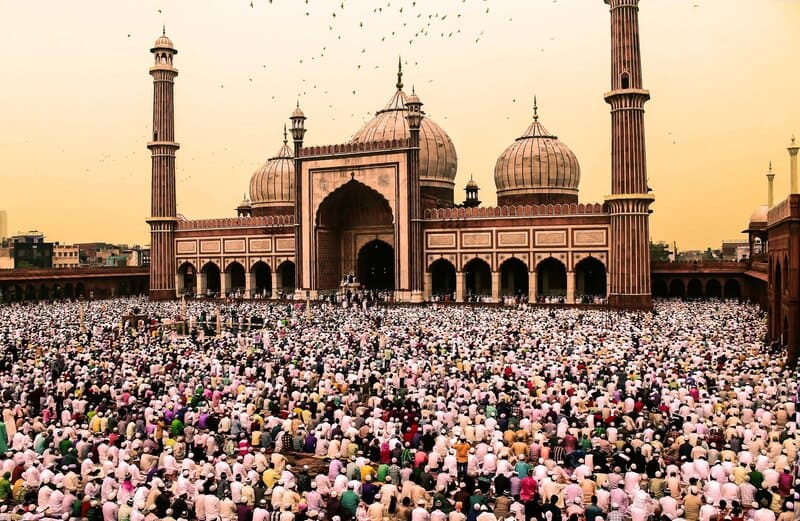
The vibrant month of Ramadan
V. Influence and Role of Islam in Society and the World
The role of Islam in shaping history is undeniable, and Islamic civilization has left indelible marks on the world.
Historical Role and Islamic Civilization
During the Middle Ages, Islam was a beacon of knowledge and innovation. Muslim scholars preserved and expanded upon the works of ancient Greece, while also pioneering many groundbreaking inventions. Islamic science flourished in fields such as:
- Mathematics: Introduced the Hindu-Arabic numeral system (the numbers we use today), the concept of zero, and developed algebra.
- Astronomy: Built observatories, invented many observational tools, and contributed to the understanding of the movement of celestial bodies.
- Medicine: Wrote medical encyclopedias, performed advanced surgeries, and established the first hospitals.
- Architecture: Developed a distinctive architectural style with domes, pointed arches, and intricate geometric patterns, exemplified in mosques, palaces, and massive libraries.
- Education: Established the world’s first universities, such as Al-Azhar (Cairo) and Al-Qarawiyyin (Fes), attracting scholars from all over.
Contributions in Modern Society
In modern Islamic society, the religion continues to profoundly influence politics, economics, and culture in many countries, especially in the Middle East, North Africa, Southeast Asia, and the rapidly growing Muslim communities in Europe and North America. The diversity of Islamic culture is also evident in various forms of Islamic art, from calligraphy and ceramics to music and poetry, contributing to the world’s cultural landscape.
Modern Social Issues
Along with its positive contributions, Islam also faces some complex social issues in the modern world. Topics such as women’s rights in Islamic society, religious freedom, and misunderstandings about extremism are often debated. However, it is important to emphasize that the vast majority of Muslims worldwide strive for peace, tolerance, and justice, and extremist actions do not represent the entire religion. A deeper understanding helps us distinguish authentic teachings from deviant behaviors.
VI. Frequently Asked Questions about What Islam Is
There are many questions surrounding what Islam is and related aspects. Below are the most frequently asked questions that Nuhaira believes will help you get a clearer view.
What is Islam?
As mentioned, what is Islam? It is a monotheistic religion that worships Allah as the one and only God, and follows the revelations conveyed through the Prophet Muhammad, recorded in the Quran. The meaning of the word “Islam” is “submission to the will of Allah”.
Differentiating between “Muslim” and “Islam”
This is a common question. “Islam” is the name of the religion. Meanwhile, a “Muslim” is the noun for a follower of Islam, that is, a believer in this religion.
Is Islam a violent religion?
No. The core teachings of Islam emphasize mercy, peace, justice, and tolerance. The Quran and the teachings of the Prophet Muhammad encourage reconciliation, treating everyone well, and only permit fighting in self-defense or against severe oppression. The extremist actions of some individuals or small groups are often mistaken as representative of all of Islam, but in reality, the vast majority of Muslims worldwide strongly condemn acts of violence and terrorism, which do not reflect the true teachings.
The role and rights of women in Islam
In Islam, women are recognized as having a distinct status and rights according to the Quran and Sunnah. They have the right to own property, the right to education, the right to work, and the right to participate in social activities. However, the application of these rights can vary depending on cultural traditions, national laws, and different interpretations of religious doctrine. Although there are misconceptions about oppression, Islam fundamentally protects the dignity and rights of women.

VII. Conclusion: The Significance of Understanding Islam Correctly Today
The journey to discover what Islam is has taken us through its basic definitions, brilliant history of formation, profound doctrines, diverse customs, and the immense contributions of this religion to human civilization. Clearly, Islam is one of the world’s most important religions, with a far-reaching influence on global history, culture, science, and social life.
In today’s volatile world, having an objective perspective and respecting religious diversity are key to building an inclusive, open, and strong society. Correctly understanding the nature of peace, tolerance, and justice in the teachings of Islam will help us eliminate prejudice, enhance intercultural dialogue, and promote international cooperation.
To continue the journey of learning about Islam more deeply, Nuhaira encourages you to:
- Read the Quran: Find reputable translations to directly experience the teachings.
- Learn through the Muslim community: Contact local Muslim communities or experts to get an authentic view of practices and life.
- Access credible sources: Always select information from academic websites and reputable religious research organizations.
Hopefully, this article has brought you new and valuable perspectives on Islam. If you have any other questions or concerns about this topic, don’t hesitate to share them with Nuhaira. Let’s continue to explore and build a world of mutual understanding and respect!
See also:

